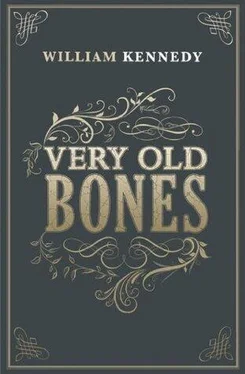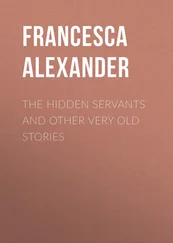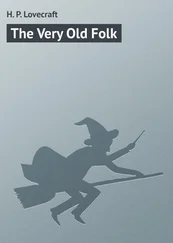I won money regularly for months, not a great deal, but enough to handle my scaled-down plan for keeping Giselle dazzled. She and I focused on the restaurants of Frankfurt, all of them within range of my military wages, even the Bruckenkeller and the outdoor café with violins at the Frankfurter Hof. We took day trips to Wiesbaden and Bad Nauheim for the baths and the Spielbanks, where we swam, bathed in steam, and spectated at the roulette and baccarat. We wandered the ruins of Frankfurt and took pictures of each other standing in the rubble of the opera house, or in somebody’s exploded parlor, or on the altar of a church with no roof, or in Goethe’s bedroom, or trying to find Schopenhauer’s old digs in Sachenhausen. I recounted Schopenhauer’s argument for Giselle: that the body is the objectification of the will. Tooth and penis, eye and vagina, were all created by the needs of the soul, no? Well, maybe. But Schopenhauer loathed women and called his white poodle Atma, the Soul of the World. I told Giselle she was the soul of my world, vividly isolating life for me: golden hair with violin, perfect knees crossed for wild arousal as taxi moves along Hauptwache. Phantom queen as art object. Clearly an existence such as hers was not happenstance. Clearly some arcane will had divined this glorious object in order to reflect what will demanded beauty must become. Schopenhauer had a point.
“I love the way you talk to me,” she said.
In these rapturous days she and I came to understand each other ever more intimately, finding where our intensities lurked, how soon boredom enveloped us, and why. Her goal, she said, was freedom, and she felt free with me.
“I think I want to be with you from now on,” she said.
I took kindly to this idea.
“Life traps you,” she said. “It trapped my father when the Gestapo shot him for hiding two Jews. But they didn’t kill him; they just shot him and left him there in the courtyard, and he became an invalid and made my mother his bedside prisoner for three years, until he finally died.”
“You don’t want to be a prisoner,” I said.
“I think not.”
“Did you love your father?”
“Tremendously. But it was pitiful how my mother withered. My brothers took her gallery away from her in 1948. She had Picassos, Van Goghs, Mirós she’d kept hidden all during the war years and she wouldn’t sell them. My brothers couldn’t stand that money being there, inaccessible to them.”
“You didn’t want the money?”
“I wanted my mother to keep everything, but they got the paintings away from her and sold them. And then she died too. A prisoner with no money.”
“But she loved your father.”
“I suppose she did.”
“Then she was a willing prisoner.”
“I couldn’t say. She did her duty, as you military people say.”
I vowed not to become a prisoner. I vowed not to let Giselle become one. I vowed I would have money enough for us to live idyllic lives of love and freedom. I vowed to keep her with me now and tomorrow; always now, always tomorrow. That was my best-laid plan, and the reason I again became a poker player.
I preferred five players to six or seven, for I handled the cards more often. I told my fellow gamesters how great a player I was, how I knew cards. I told them how Nick the Greek, by the third card in a five-card-stud game, could call everybody’s hole card, and that I was Nick’s spiritual disciple. I intimidated them, and I became the one to beat. When I lost they were buoyant at the braggart’s fall. That was my method, of course, putting their money where my mouth was.
I didn’t mind keelhauling Popp, who could afford it, or Jelke, who was a schmuck, but I trod lightly with the Captain when I nailed him (“With all due respect for your rank and position, Captain, I must raise you thirty dollars”), for he was angry enough at me already and I didn’t want to be sent down to a line company. I had to keep an eye on Quinn’s earnestness, and watch over Archie too, but Arch was a sap gambler who didn’t mind losing.
The game went on for months and slowly I built a bankroll to finance my addiction to Giselle’s joys. We played for scrip, the dollar-equivalent currency the army had used since 1946, but sometimes players used German marks, at the legal rate of four marks to the dollar. The Captain often played with marks, for he was getting fat from his black-market deals. His sisters in Bridgeport sent him huge cartons of tea, coffee, cocoa, and cigarettes, and he’d sell it all to Germans at quadruple his investment. I’d done a bit of that too, but it smacked of grocery clerking, and so I concentrated on the game and sold my scrip winnings for the street price of five marks to the dollar, a modest profit, but the way to go as long as Giselle and I were cultivating rapture on the German economy.
And then Italy loomed, for I’d proposed to Giselle and told her we’d honeymoon in Venice. To do this right I needed dollars, not marks, and I mentioned during the game that because of stateside publicity on military black marketeering, the army was hovering over us all, their gumshoes noting who exchanged how many marks for how many dollars in excess of our monthly wages. I wondered out loud where to change marks for bucks outside army channels.
“I know somebody,” Archie said. “Not a very savory character.”
“Who is he?” asked the Captain before I could ask.
Archie said his street name was Meister Geld, and that he could be reached through the Rhineland Bar, off Kaiserstrasse near the Hauptbahnhof, an arena of whores, beer halls, and black marketeers. But, said Arch, if you’re in uniform they won’t let you in. I was ready for that. The uniform was required everywhere in Germany but I’d picked up civilian clothes for traveling, and had also bought a cheap blue German suit, a chalk-stripe double-breasted with ridiculously wide lapels. I’d bought it one size too small so whenever I put it on I ceased looking American and could pass for a working-class German. The suit seemed just right for living anonymously, or hanging out in an off-limits bar, which is what the Rhineland was.
Six years after the surrender Germany remained treacherous, full of entropic hatred. Some of the hate eventually found outlets: packs of GIs breaking fascist heads during binges of vengeance; GIs found face down in the gutter with two broken arms, or floating in the river with a knife in the back, or a slit throat. Too many killings and maimings took place in or near the Rhineland, a watering hole for unreconstructed Nazis, so the MPs put it off limits. A weathered sign in English was tacked to the door of the club:
Dear Mr. G.I. Sorry but you cannot come in.
Tonight is open only to club members.
The Manager
I went in and ordered a schnapps and sat across from a chesty, frizzy-haired woman I took to be a whore. She smiled at me and I smiled back and shook my head no. When the bartender brought my drink I asked him about Meister Geld and he said, “ Nicht verstehen. ” I repeated the question in French and invoked Archie Bell as my contact, but the barman still didn’t get me. The woman came to my table and asked in French what I wanted and when I told her she said the barman didn’t know anybody by that name but she did, and then in English asked, “What you want with Meister Geld?”
“It has to do with money,” I told her.
She made a phone call and came back and said she would take me to him. I drank my schnapps and we went out. It was April in Frankfurt, a sunny day with a bit of a nip to it, and I made a mental note to buy a lighter-weight German suit for the summer.
“You speak bad French,” the woman said, taking my arm. “Why not speak you English to the man?”
“I didn’t want him to know I was American.”
Читать дальше












